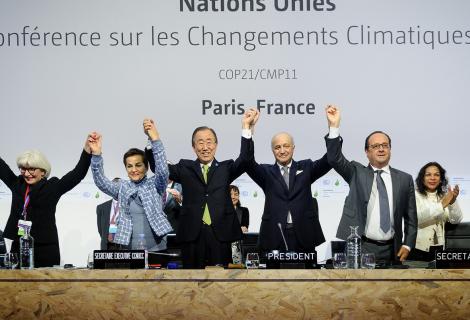Ten years after Paris: Why equity is the condition for EU climate leadership at COP30

Ten years after the adoption of the Paris Agreement — arguably Europe’s most successful diplomatic endeavour — the European Union faces a paradox of its own making. The very framework it helped create to govern collective climate action now exposes the limits of its leadership. The Paris Agreement symbolised Europe at its best: able to marry rules-based cooperation and climate ambition to mobilise others through trust and equity.
By emphasizing the close relationship between climate action, sustainable development and a just transition in the Preamble of the Paris Agreement, the EU recognised that the transition could only succeed if it was just — if every nation had the means to act. A decade later, its failure to keep equity at the core of the transition now threatens the very system that sustains its influence. Equity is not moral idealism but the political realism that made the Paris Agreement possible — and COP30 is the moment for Europe to return to that principle.
Europe at a crossroads: leading the transition or defending the past
The global economy is reconfiguring around clean energy, critical minerals and low-carbon technologies. Clean investments have now overtaken fossil fuel funding while oil and gas production in many parts of the Global South has plateaued or begun to decline. Europe has been part of this shift but has not fully embraced what this transformation implies for its role in the world. The privileges built on fossil energy and financial dominance are now also dependencies that constrain its capacity to act.
This ambivalence increasingly looks like backtracking. Caught between the need to transform and the pressure to protect entrenched interests at home, the EU is struggling to take a clear direction of travel. While others turn the transition into a lever for leadership — as China and through green industrial policy and overseas clean-tech investments— the EU is hesitating just when it should be leading. Many countries in the Global South share aspirations for clean growth but lack the means to realise them. Europe, by contrast, has the resources and institutions to make this transition genuinely shared, if it chooses to invest in balanced partnerships rather than preserve old hierarchies.
This contradiction is also visible in the EU’s negotiation tactics. At COP28, it could have led a credible push for a fossil fuel phase-out had it paired ambition with differentiated timelines and real means of implementation. In Baku, rather than engaging constructively on a finance goal aligned with countries’ needs, it sought to narrow its obligations by linking public finance under Article 9 to broader discussions under Article 2.1(c). This blurred the line between them and weakened a key provision that could have helped Europe bring others along in building robust sustainable finance frameworks — in line with its own interests.
These moments capture a deeper truth: when the EU treats equity as a concession rather than a condition, it loses the capacity to shape results. A fairer approach is not a moral indulgence; it is how Europe ensures that the transition remains shared and politically possible.
Rebuilding credibility through justice
To remain a credible force in Belém, Europe must turn equity into practice.
- Make Just Transition the foundation of shared development.
A just transition is not an abstract ideal; it is what allows climate ambition to translate into better lives and stable societies. If nations and people are only imposed losses — of development opportunities, jobs, livelihoods, or affordable food and energy — they will resist change. Europe has experienced this first-hand, from the yellow vest movement to farmers’ protests.
At COP30, the EU should therefore support the creation of a Belém Action Mechanism on Just Transition — a global platform to coordinate, share experience, guide implementation and increase just transition finance. Its purpose: to anchor just transition in decarbonisation pathways, turning equity into the condition that makes ambitious decarbonisation possible. - Rebuild trust through fair and accountable climate finance.
Finance is the backbone of trust in the regime — and the space where EU leadership is most tested. The EU should acknowledge that the New Collective Quantified Goal left key questions on public finance unresolved and support a dedicated process to clarify the quality and scale of public, while preparing a multiannual pledge. The EU should foster constructive progress under Article 2.1(c), showing readiness to lead on phasing out fossil fuel finance and subsidies, while recognising that these efforts will follow nationally determined pathways. It should also lead in addressing “global disenablers” — from debt to financial architecture reform — to ensure finance becomes a driver of shared transition, not division. - Protect the vulnerable to make the transition viable.
A fair transition cannot advance if those least responsible for the crisis face its worst impacts. The EU should therefore back a new predictable public finance goal for adaptation under the Global Goal on Adaptation and scale up support to the Loss and Damage Fund. Similarly, existing multilateral climate funds require urgent replenishment to meet the tripling target by 2030. The bare minimum is for the EU to signal its intent to meet that commitment.
These are not concessions to climate justice. They are the conditions of the EU’s influence and its capacity to shape the future of the international climate regime. Multilateral negotiations are a two-way process, and the EU cannot expect to influence others if it does not address its partners’ fundamental interests. Ten years after Paris, the real test of Europe’s leadership is not how loudly it calls for ambition, but whether it can make that ambition work — for everyone.